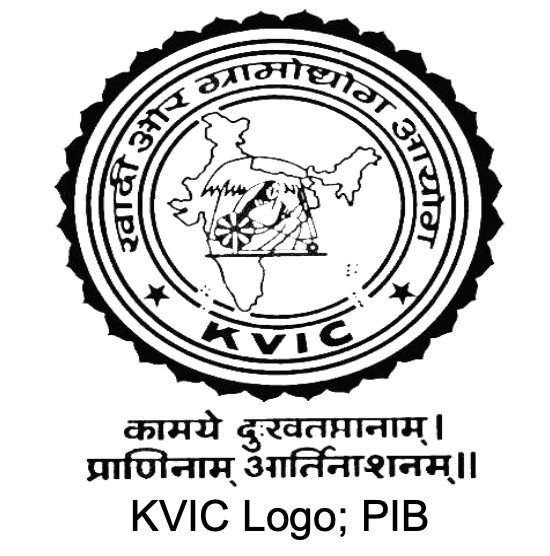New Delhi, July 12: Khadi and Village Industries Commission (KVIC) recently received trademark registrations in three countries: Bhutan (on 9th July), the United Arab Emirates (UAE, on June 28th, the first time in a Gulf country), and Mexico (December 2020), bringing the total number of countries where it has trademark registrations to nine. KVIC previously owned trademark registrations in six countries for the word mark “Khadi”. They are Germany, the United Kingdom, Australia, Russia, China, and the European Union. This is a key step in protecting the brand “Khadi’s” global identity.


KVIC is actively pursuing trademark applications in 40 countries throughout the world, including the United States, Qatar, Sri Lanka, Japan, Italy, Australia, New Zealand, Singapore, Brazil, and others.
History: The Khadi and Village Industries Commission (KVIC) is a statutory (determined or regulated by law) organisation established by the Government of India in 1956 under the KVIC Act. In 1920, the Swadeshi Movement used the term Khadi as a political weapon. It essentially means hand-woven or hand-spun fabric made on a charkha or wheel. The KVIC claims exclusive use of the trademark ‘Khadi,’ as it gained registration of the mark and has been using it for a few products since 1978. The Ministry of MSME regulations announced in 2013 empowered KVIC to grant ‘Khadi Mark’ registration and collect royalties from any manufacturer who uses the Khadi Mark.

The Indian government wishes to market Khadi as an “Indian Brand” on a worldwide scale. However, as Khadi’s popularity has grown, these trademarks and symbols have been repeatedly misused by private players for monetary gain. KVIC is pursuing lawsuits against numerous national and international violators of the Khadi Mark Regulations.
National Violations:
On the domestic front, KVIC has taken a harsh stance in recent years, forcefully defending its brand name due to multiple infractions. In the recent past, KVIC issued notices to 1000 businesses in India, including a well-known apparel chain, for misusing these symbols and engaging in unfair trade practises. KVIC has demanded Rs 500 crore in damages from the clothing firm, and the case is currently ongoing in the Mumbai High Court.
Recently, KVIC has won trademark infringement cases in Delhi High Court against Ghaziabad- based trader JBMR Enterprises for manufacturing and selling counterfeit Khadi Prakritik Paint (on June 4), Khadi Design Council of India and Miss India Khadi Foundation for using the brand name (May 2021), and IWEARKHADI” for using the brand name Khadi and the Charkha symbol (March 2021).
The World Intellectual Property Organization (WIPO), a United Nations specialised agency for brand protection around the world, has barred a Delhi-based firm from using the domain name www.urbankhadi.com, which illegally uses the brand name “Khadi” in “bad faith” and to benefit from Khadi’s goodwill.
Because of KVIC’s determination, Flipkart, Amazon, and Snapdeal were forced to remove 160 fake Khadi products off their websites.
International Violations:
In Mexico, “One Foundation Oaxaca Ac,” had applied for the “Khadi” logo. KVIC successfully challenged and won the trademark application. Similarly, in Germany, KVIC challenged a local firm, Best Natural Products GmbH (“BNP”), which had already obtained prior rights in the mark “KHADI” and associated marks in the EU and other countries in several classes in 2011. After a lengthy legal struggle and diplomatic consultations with the assistance of the Ministry of External Affairs, BNP has declared its willingness to settle trademark problems peacefully with KVIC.
Khadi’s popularity has skyrocketed in recent years, both in India and beyond. As a result, it has become critical for KVIC to defend the identity of Khadi while also protecting the interests of lakhs of Khadi artisans who produce genuine Khadi items. For the first time in KVIC’s history, continuous efforts have been made in the last 5 years to protect the trademark. KVIC has put in place a strong online strategy to properly monitor the “Khadi India” trademark. It has formed a dedicated legal and search team, complete with technological tools, for systematic and continuous monitoring. This will aid in the identification of unlawful products sold under the guise of Khadi. KVIC is also warning all registered Institutions engaged in Khadi product manufacture that mere registration with KVIC does not empower them to re-authorize anyone to use the “Khadi” trademarks or the “Khadi India” emblem unless that firm or company acquires a suitable licence from KVIC for the same.
Why is Trademark protection Important?
Let’s look at this through the lens of a short tale. Mehra Sweets is a family-run sweet shop that has been in operation for over 50 years. They are well-known for producing high-quality sweets using only the finest ingredients. Mehra Sweets has been a household name in the town for two generations, and the town has grown in popularity and is known for its Mehra Sweets. A few freshly opened sweet shops began selling sweets under the moniker Mehra Sweets. People looking to acquire the popular Mehra Sweets are unable to tell the difference between the original and those supplied by the new sellers. This leads to not only financial losses for Mehra Sweets, but also a loss of popularity because of the low-quality sweets sold by the new businesses.
How can the Mehra family defend itself against the numerous imposters?
A trademark could be a viable option. A trademark is a logo or phrase that represents a company’s business and allows customers to distinguish one company’s product from another’s product. This is to protect companies like Mehra Sweets’ hard-earned reputation and to prevent others from profiting from the goodwill they have created with hard work. Using a Trademark will allow the Mehra family to sue anyone who uses the tradename without permission and thus save the business.

